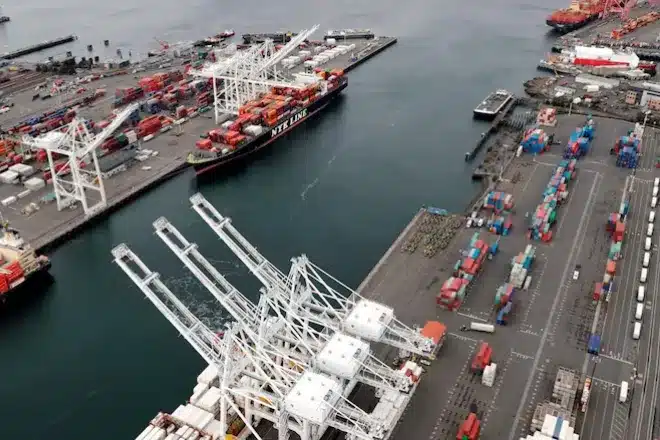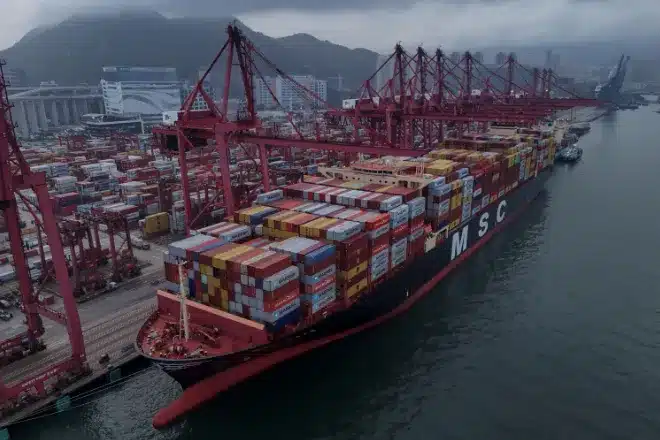China has begun quietly granting exemptions on critical U.S. imports despite public denials of negotiations, as businesses report pharmaceutical and aerospace products entering without punitive tariffs. This strategic move could signal the first step toward easing the trade war that has frozen commerce between the world’s largest economies.
Contents
Which U.S. Imports Are Being Exempted?
China has begun exempting select U.S. imports from its steep 125% tariffs, according to multiple business sources, potentially signaling the first steps toward easing the trade war between the world’s largest economies. While China has not publicly announced any exemption list, industry insiders report that several critical U.S. imports are now entering China without the full tariff burden:
- Pharmaceutical products: American Chamber of Commerce in China president Michael Hart confirmed that certain U.S. drug imports have received exemptions.
- Aerospace components: French aircraft engine maker Safran revealed that China has granted tariff relief on “a certain number of aerospace equipment parts” including engines and landing gear.
- Essential supply chain materials: Reports suggest petrochemicals like ethane, which China can only source from the U.S., are also being considered for exemption.
An unofficial list circulating among Chinese businesses reportedly includes 131 categories of U.S. imports potentially eligible for exemption, representing approximately $45 billion worth of imports to China last year, according to Huatai Securities.

Strategic Motivations Behind U.S. Import Exemptions
China’s Ministry of Commerce has established a dedicated task force collecting lists of items that could be exempted from tariffs, actively engaging with companies to identify which U.S. imports are irreplaceable in their supply chains.
“The Chinese government has been asking our companies what sort of things are you importing to China from the U.S. that you cannot find anywhere else, and so would shut down your supply chain,” explained Hart.
This targeted approach to U.S. imports suggests China is balancing economic pragmatism with political positioning, as Friday’s statement from the Communist Party’s Politburo emphasized domestic stability and support for firms affected by tariffs rather than acknowledging any exemption program.
Communication Disconnect Between U.S. and China
Despite the apparent tariff relief on select U.S. imports, diplomatic channels remain contentious:
- President Trump told reporters he had spoken with Chinese President Xi Jinping “numerous times.”
- The Chinese Embassy firmly denied any talks between the countries, urging the U.S. to “stop creating confusion.”
- Trump separately claimed to Time magazine that he had made “200 deals” to be completed within weeks.
Economic Context Driving Decisions on U.S. Imports
China entered this trade conflict facing significant economic challenges, including rising unemployment and deflationary pressures. While maintaining a trillion-dollar trade surplus in 2024, China relies heavily on specific U.S. imports for key industries.
Meanwhile, President Trump has indicated what he considers success in the trade relationship, telling Time magazine he would view tariffs of “20% to 50%” a year from now as a “total victory” – suggesting he may be open to reducing the current 145% tariffs on Chinese goods if China continues offering relief on U.S. imports.

What This Means for Businesses Relying on U.S.-China Trade
For companies navigating the complex trade relationship, these exemptions on U.S. imports represent a potential lifeline, particularly in sectors where alternative suppliers are limited. Businesses should monitor developments closely as both nations appear to be seeking ways to reduce economic damage while maintaining tough public positions.
As the situation develops, the focus on critical U.S. imports could provide a roadmap for how the two economic powers might eventually find their way back to a more stable trading relationship, even if comprehensive negotiations remain elusive for now.
About H2T Finance
H2T Finance delivers real-time financial news, keeping you up to date with market movements, policies, and global economic events. As part of H2T Media Group, we are committed to providing accurate information and in-depth analysis, helping investors make quick, confident decisions in an ever-changing financial landscape.
For inquiries or personalized assistance, feel free to contact us:
📞 Phone: +84933.948.888
📧 Email: [email protected]
📍 Address: 4/567 Tổ 10 Khu Phố Hòa Lân 1, Thuận An, Bình Dương, Vietnam
At H2T Finance, your success is our priority.
